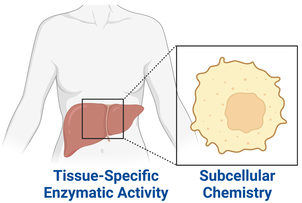Research
Chemical Tools To Investigate Spatially Organized Chemistry in Human Health
|
Research Focus
The broad focus of our research is to understand how spatially organized chemistry influences human health through the development and application of new small molecule chemical tools and technologies. Current projects in our group address location-dependent problems at the tissue and subcellular (organelle) level. These project areas utilize multiple techniques and strategies to achieve their goals, allowing trainees in our laboratory to develop a diverse set of skills in the fields of biochemistry, chemical biology, synthetic organic chemistry, medicinal chemistry, and molecular biology. |
Created with BioRender.com
|
Current Projects
Research Area 1: Fluorogenic Chemical Tools for Examining Tissue-Specific Enzymatic Activity
Goals: Our group will develop fluorogenic chemical tools to study enzyme activity and use them to investigate the role of enzymes in context of their tissue localization.
Training Opportunities: Students on projects in this research area gain experience in organic synthesis, molecular docking, fluorescence microscopy and spectroscopy, mammalian cell culture, in addition to various biochemical, molecular biology, bioanalytical, and biophysical approaches.
Impacts: Our chemical tools and the studies they enable will reveal the role in human health of enzymes of interest in context of their tissue-dependent localization. These new biological discoveries will be leveraged to improve and develop new therapeutics.
Publications:
Goals: Our group will develop fluorogenic chemical tools to study enzyme activity and use them to investigate the role of enzymes in context of their tissue localization.
Training Opportunities: Students on projects in this research area gain experience in organic synthesis, molecular docking, fluorescence microscopy and spectroscopy, mammalian cell culture, in addition to various biochemical, molecular biology, bioanalytical, and biophysical approaches.
Impacts: Our chemical tools and the studies they enable will reveal the role in human health of enzymes of interest in context of their tissue-dependent localization. These new biological discoveries will be leveraged to improve and develop new therapeutics.
Publications:
- Carbonate-Based Fluorescent Chemical Tool for Uncovering Carboxylesterase 1 (CES1) Activity Variations in Live Cells
- Human Carboxylesterases and Fluorescent Probes to Image Their Activity in Live Cells
Research Area 2: Small Molecule Techniques for Investigating Subcellular Chemistry
Goals: Our group will generate new modular chemical technologies that can deliver probes and other cargoes to specific subcellular compartments in human cells. These new approaches will then be used to develop target chemical tools to specific compartments to study their (bio)chemistry.
Training Opportunities: Students on projects in this area will gain experience in organic synthesis, peptide and peptoid synthesis, molecular docking, fluorescence microscopy, traditional medicinal chemistry techniques including structure-activity relationships, and mammalian cell culture in addition to various biochemical, molecular biology, bioanalytical, and biophysical approaches.
Impacts: The new versatile and modular subcellular targeting methods we develop will allow for more detailed studies of the role of these organelles in human health. A better understanding of the biology of these organelles paired with our intracellular delivery approaches will enable the development of improved chemical tools and therapeutics.
Publications: Coming soon!
Goals: Our group will generate new modular chemical technologies that can deliver probes and other cargoes to specific subcellular compartments in human cells. These new approaches will then be used to develop target chemical tools to specific compartments to study their (bio)chemistry.
Training Opportunities: Students on projects in this area will gain experience in organic synthesis, peptide and peptoid synthesis, molecular docking, fluorescence microscopy, traditional medicinal chemistry techniques including structure-activity relationships, and mammalian cell culture in addition to various biochemical, molecular biology, bioanalytical, and biophysical approaches.
Impacts: The new versatile and modular subcellular targeting methods we develop will allow for more detailed studies of the role of these organelles in human health. A better understanding of the biology of these organelles paired with our intracellular delivery approaches will enable the development of improved chemical tools and therapeutics.
Publications: Coming soon!
